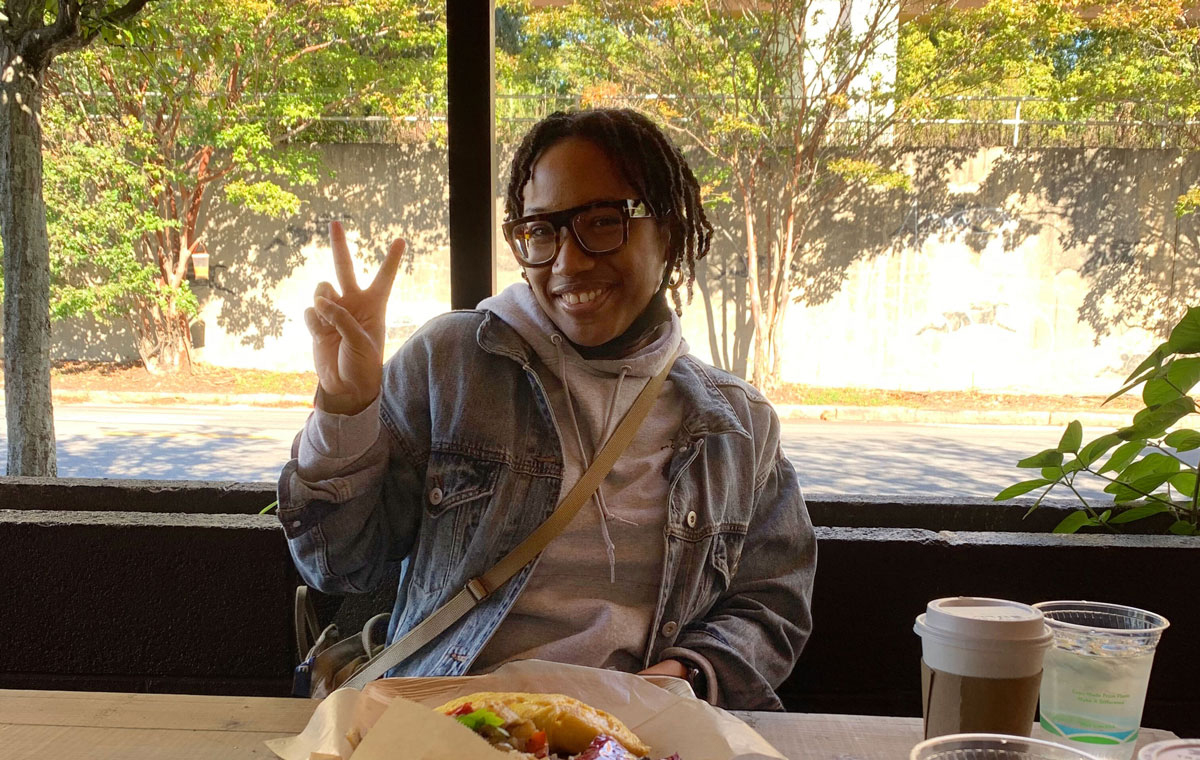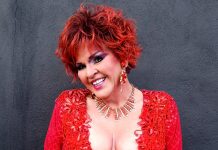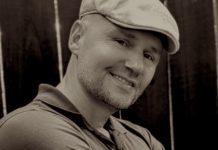
Photograph courtesy of Khoa Tran
We learned about the loss of one of our own over the news feeds.
Sierra Jenkins, Atlanta magazine’s former editorial intern–turned–fact-checker and researcher, was caught in the crossfire of a shooting in downtown Norfolk, Virginia, where she worked as a full-time reporter for the Virginian-Pilot and Daily Press.
The shooting, which happened just as Chicho’s Pizza Backstage Restaurant and Bar was closing for the night on March 18, left three wounded and two dead—including Sierra, who later died at the Sentara Norfolk Hospital, her father, Maurice Jenkins, confirmed. Devon M. Harris, a 25-year-old Portsmouth, Virginia resident, was pronounced dead at the scene, according to police.
Had Sierra not been there at that moment a short while after midnight, had she not walked out the door at the wrong time, she would have been assigned to cover the shooting come daylight. It was her turn to take the breaking news shift that weekend, but her editor’s repeated attempts to reach her went unanswered.
• • •
A week ago, on March 13, Sierra turned 25—the age where we all let out a collective sigh of relief. If a person reaches 25, they have survived the perils of adolescence and the potential thwarts of nascent adulthood and, all things being equal, have acquired many of the tools needed to forge into life.
A Georgia State University grad, she joined Atlanta magazine as an editorial intern in 2019 and quickly ascended to star fact-checker status, with editors unabashedly vying for her insight and meticulous eye.
Interns typically stay at the magazine for one semester, but as Sierra’s time came to a close, she told then-managing editor Heather Buckner, who had supervised Sierra’s internship, that she wasn’t ready to leave. “We didn’t want her to leave either, so she stayed through the summer as an intern—and then three years after that, as a freelance fact-checker,” Heather says.
Heather told me that they’d bonded over drinking coffee and talking politics. Sierra’s go-to then was a triple grande caramel latte. “She was an impossible combination of beautiful and smart and funny and ambitious and kind. She had a bright future ahead of her; she was supposed to go on to bigger and better things and lead an amazing life—and we got to see the beginnings of that,” says Heather. “It’s hard to believe that this is all we got to see. She deserved more.”
When Sierra was hired at the Virginian-Pilot in her hometown of Norfolk, she told Heather she “almost shed a tear” reading her offer letter about her “employment as a journalist.”
“She was thrilled about her very first front-page story,” Heather says. “She sent me an all-caps text—“I MADE THE FRONT PAGE TODAY!!”—with a Live Photo of her holding up the newspaper, laughing.”

Photograph courtesy of Heather Buckner
Betsy Riley, Atlanta’s editor-in-chief, says that Sierra’s enthusiasm and passion for journalism inspired the editorial team.
“When she was an intern, her brilliant smile made everyone’s day better. And when she transitioned to researcher and fact-checker, I would always breathe a sigh of relief when I saw that she’d been assigned to an important story. Even after she moved to Virginia, Sierra still felt like part of our team,” Betsy says. “We’ve heard about and written about so much loss in the last two years, but I don’t think we’ll ever get past losing Sierra.”
Steve Fennessy, Atlanta’s former editor-in-chief and executive editor, remembers Sierra as being “incredibly earnest and forthright.”
“She really believed in this business for the reasons I think that get a lot of us into it, but then what happens to a lot of us is we get jaded,” he says. “So, meeting somebody like her, with such enthusiasm for what we do and the calling that it can be, was really encouraging.”
From the very beginning, Sierra was clear about her strong beliefs in the power of journalism. In a short introductory email to the Atlanta staff when she started her internship, she wrote, “I’m passionate about storytelling because of its ability to educate and inspire others. Inspire others to live authentically, take risks, challenge the status quo, and unlearn the ideologies society has conditioned some to believe.”
“I think she probably did more for us than we did for her, ultimately,” Steve says.
To Khoa Tran, Atlanta’s former art director, Sierra was an amazing friend, full of good energy. “She was always ready to receive me, to hear me,” writes Khoa, who would often invite Sierra to photoshoots with the art department. “We chatted about our dreams and our plans for the future [and] she’d say, ‘Khoa, you’ve got this!’”
• • •
I said as much—you’ve got this!—to Sierra during our last phone conversation a little while ago.
“Sierra, do you have time for a quick five-minute chat?” I texted her at 10:01 a.m. on a Tuesday morning. I wanted to go over some details with her about the latest fact-checking assignment for the April issue—a package about the one-year anniversary of the Atlanta Spa shootings—but also wanted to touch base, as we’d do from time to time.
“Sure!” she replied less than a minute later.
Five minutes spilled into well over an hour.
At that point, Sierra had just been assigned the education beat at the Virginian-Pilot and was feeling both the pressure of the role and the pivot from breaking news—much like when she toiled with Atlanta’s former deputy editor Mara Shalhoup over whether she should stay at CNN after her internship in 2020, or forge a new path in her hometown.
We talked about navigating the bureaucracy and politics of the education beat: how to build your sources, how to respond to public information officers, how to center the students—the children—in her reportage. I connected her with Eric Stirgus, a veteran education reporter at the AJC, who was graciously poised to take her under his wing.
But it was the latter part of our conversation that lingers for me. I distinctly remember how the mid-morning sun was hitting my plants. I watered them one by one as we spoke and noted that talking to Sierra felt light and warm, as if I was in the presence of the future.
She gushed about her brand-new apartment and how she finally felt like she was adequately “adulting:” paying bills, saving money, buying nice things. She talked about her plans to decorate, her morning routine that she was still tweaking and perfecting, the quiet moments of solitude that she was taking to pause, reflect, and plot. She planned to continue her reporting work but, deep down, eventually wanted to do more research. She had her eye on public policy—something that she said she hadn’t said out loud much. She spoke then and often about her family’s support as she settled into her day-to-day life, like her father and mother, who both built this bright star from scratch.
• • •
We’re not supposed to have to rummage through text threads and call logs and social media posts to piece together the final moments of a life truncated by gun violence.
Sierra’s last public post on Facebook was a picture, without comment, of Breonna Taylor, the 26-year-old medical worker in Louisville, Kentucky, who, just after midnight on March 13, 2020, was riddled with bullets that killed her while she slept.
That the shooting happened on March 13, Sierra’s birthday, was probably not lost on her. Nothing was.
Several posts before that, Sierra had a lot to say—this time, about the deadly rally in Charlottesville, Virginia, in the summer of 2017. “I need to see more of my peers, in my age bracket, showing more interest in what is going on. Not just on social media, but just in general,” she wrote. “One thing that I have been hearing lately is if you’re not personally affected it doesn’t matter, and you’re wrong . . . Nothing about this is ok.”
Sierra was a kind and brilliant young woman on the cusp, at the beginning . . . at her beginning.
Nothing about this is ok.













